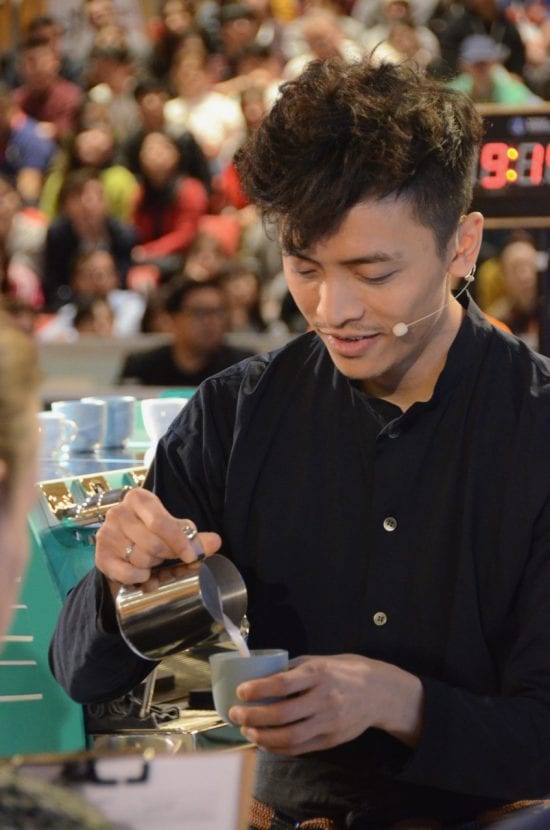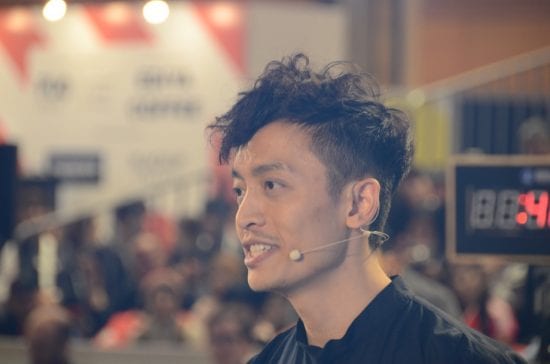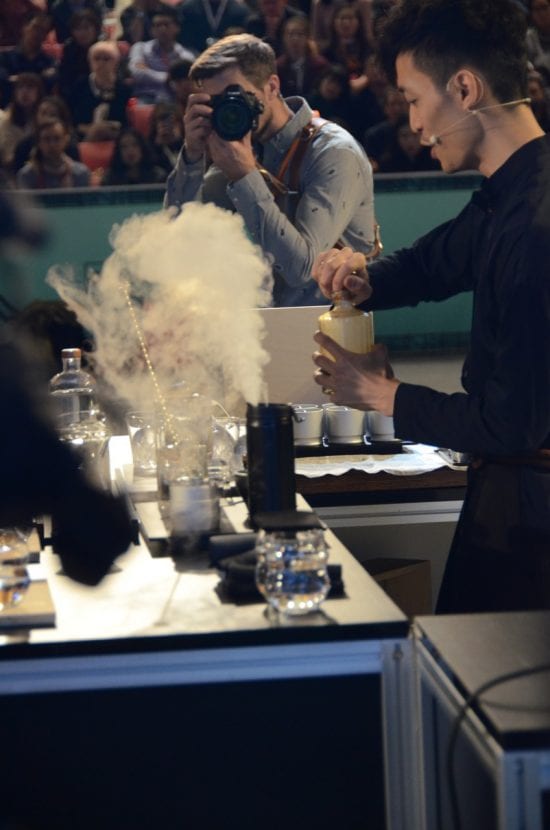
Kapo Chiu is the owner of Cupping Room in Hong Kong and placed third in this year’s World Barista Championship. A seasoned competitor, Kapo talks about his coffee beginnings, shares his signature drink, and explains why he aimed for simplicity in his routine.
BY ASHLEY RODRIGUEZ
BARISTA MAGAZINE ONLINE
Photos by Kenneth Olson
Kapo Chiu placed third at this year’s World Barista Championship in Seoul, South Korea. A seasoned competitor, Kapo also owns and operates Cupping Room and its four locations in Hong Kong, and has recently started roasting and sourcing coffee in partnership with Sweet Bloom Coffee Roasters in Denver. Considering all on his plate, Kapo’s third-place finish is especially impressive, and he talks to us about how focusing on simplicity and amazing coffee allowed him to succeed and hone in on ideas paramount to everyday coffee service.
Ashley Rodriguez: How did you get into coffee?
Kapo Chiu: While completing my MBA in San Francisco, I was inspired by the retail and coffee experience at Blue Bottle. Upon returning to Hong Kong, I felt that a similar experience was lacking in the local market. I started my first business, which was a coffee and tea shop, and this work led me to refine my focus. My first business had many limitations—low start-up capital, less-than-ideal location, and an unfocused product range. At first, I thought I would be happy to just run and operate a retail shop, but after spending time as a barista, a passion ignited in me. I really wanted to delve deeper into the world of specialty coffee, to spend time in it, and to understand it on a much more professional level. While this first business ultimately wasn’t successful in achieving my goal of bringing my ideal specialty retail experience to Hong Kong, it laid the foundation for the creation of Cupping Room.
I decided to sell my shares to my partner and started my second business with a refined focus only on specialty coffee. Cupping Room was established in 2011, which was also the first year that the WBC-sanctioned Hong Kong Barista Championships were held. Sometimes, timing can be everything. I saw the barista competition as a great way to learn quickly, meet industry people, as well as grow the brand all at the same time. Since the beginning then, the brand and business of Cupping Room has been very closely tied to the world of coffee competitions.

AR: Cupping Room, if I heard correctly, just started roasting coffee, right? Can you tell us a little bit about that?
KC: Since 2013, we have been working exclusively with Andy Sprenger at Sweet Bloom. As Cupping Room grew over the years to the four shops that we have now, we started to gain the scale that we previously lacked. Still, the relationship with Andy and Sweet Bloom remained at the forefront. We felt our purchasing ability together would be able to unlock access to better pricing, better lots of coffee, and faster consumption (which meant a shorter storage time and fresher coffee for everyone). Our entry into roasting was not in any way us saying that Sweet Bloom couldn’t satisfy our needs; rather, the relationship evolved from Sweet Bloom roasting for Cupping Room to now Sweet Bloom and Cupping Room sourcing coffees together. Our vision for what makes a tasty cup is still very much aligned.
AR: Your routine was focused on simplicity and not introducing any new tricks or innovations. Why was that important for you?
KC: After having competed year after year for four years, and after having placed second in the 2014 WBC, I took some time to reflect on the meaning of the competition for me, personally. I also used this time to think about what I can contribute to the coffee industry through competition. I recognize that the competition takes a considerable amount of investment, both in time and money, so competing continuously without taking this period for reflection was not the sustainable route to go.
I also felt that the direction of the trends in barista competitions was leading away from what I felt was most relevant to my day-to-day work behind the bar. So, all of this led me to take two years off from competing. Especially since the odds of improving (over my second-place finish) were quite slim, but the effort and investment required would still be considerably large. However, after starting to roast, I discovered another dimension that I could use to impact quality in a very meaningful way. This gave me a new message that I wanted to bring back to the competition: I could see so many new opportunities where we could improve as an industry. This routine that I prepared for 2017 went back to basics, where I didn’t add any new techniques or use any unusual varieties or processing methods. It just focused on what we as roasters and baristas must get right each step along the way to serve the best possible cup of coffee.

AR: Can you tell us a little more about the coffee you used and some of the recipes you used for espresso? What was your signature drink like?
KC: I used Gesha Village’s auction lot #72 from the Oma region of the estate, which is in the western region of Ethiopia very close to Gesha. This coffee is a Gesha 1931 variety, which closely resembles the character of a Panamanian Gesha. It’s a very young farm, started in 2011 by Adam and Rachel Overton, but their potential is clearly very high. When we tasted this coffee, we couldn’t believe that it was a natural—it tasted more like a washed coffee with high intensity of sweetness and character. The florality and sweetness were off the charts. My WBC recipe was 20g in, 45g out, 25 seconds.
My signature drink took inspiration from the world of cocktails, where the primary goal of combining ingredients and spirits was to make something tasty, in a fun and engaging way. I think that signature drinks should be delicious, and this was the main goal when designing my drink. I used Seedlip Spice (a non-alcoholic gin-like beverage “distilled” with allspice, cardamom, grapefruit, and lemon peel), a flavorless thickening agent (xanthan gum solution), non-alcoholic whiskey-barrel-aged honey, and an aroma of French Earl Grey tea mixed with dry ice.

AR: Tell us a little about the coffee scene in Hong Kong. How has it changed, and what do you hope to see in the future?
KC: Hong Kong is a very interesting place for specialty coffee. Obviously, it’s a very young and dynamic market—but there is really something to suit all tastes. Because the local population doesn’t have a long or prominent coffee-drinking history (for example, like Japan does with filter coffee), there is very little habitual/daily coffee drinking, and very little preconception on what is good, what is bad, what is expensive, and what is good value.
This means two things for retailers. First, not only do we compete with other coffee shops for customers, we are competing with tea shops, convenience stores, bars, restaurants, and fast-food shops for customers. Second, we don’t have to fight the stigma of coffee being a low priced (i.e., $1 US) consumer good. We are more successful in messaging the importance of quality and how specialty coffee is really one of the most affordable luxuries in food and beverage.
AR: How was this year’s competition for you? Will you continue to compete?
KC: Maybe you should ask me again in six weeks! I guess I’m pretty calm, but usually I’m a bit quiet and focused. I don’t interact much backstage or during the event, because sometimes it’s hard to maintain focus when there are so many friends and industry luminaries around. I think many competing baristas will understand what I mean. As far as routines go, I actually try to drink as little espresso as possible before competing. It sounds crazy, but it keeps me sharp-minded. It’s also reflective of philosophy that competing should reflect as closely as possible my everyday routine behind the bar—I don’t pull too many shots or second-guess my sensory skills when I dial in an espresso or come up with flavor descriptions in the coffee shop, so I try to do the same when preparing the day of competition.

